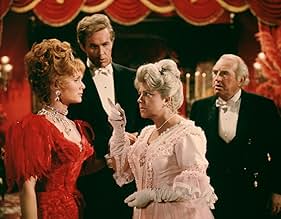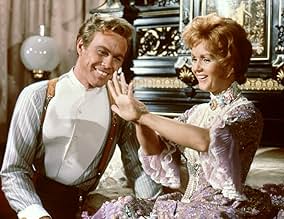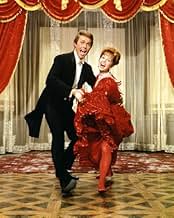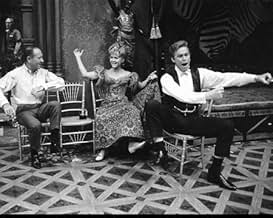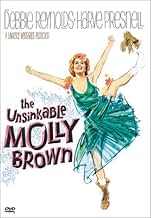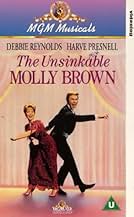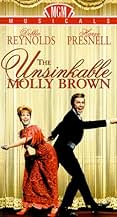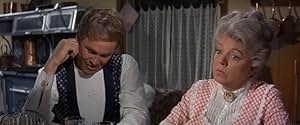Voglio essere amata in un letto d'ottone
Titolo originale: The Unsinkable Molly Brown
VALUTAZIONE IMDb
6,6/10
4479
LA TUA VALUTAZIONE
Aggiungi una trama nella tua linguaA poor, uneducated mountain girl leaves her cabin in search of respect, a wealthy husband, and a better life in this fictionalized biopic of Margaret "Molly" Brown, who survived the 1912 sin... Leggi tuttoA poor, uneducated mountain girl leaves her cabin in search of respect, a wealthy husband, and a better life in this fictionalized biopic of Margaret "Molly" Brown, who survived the 1912 sinking of the RMS Titanic.A poor, uneducated mountain girl leaves her cabin in search of respect, a wealthy husband, and a better life in this fictionalized biopic of Margaret "Molly" Brown, who survived the 1912 sinking of the RMS Titanic.
- Regia
- Sceneggiatura
- Star
- Candidato a 6 Oscar
- 5 vittorie e 13 candidature totali
Recensioni in evidenza
"The Unsinkable Molly Brown" made its debut on Broadway in 1960. Tammy Grimes, as the Molly Brown of the title, received, perhaps, the best reviews of her acting career. When it was made into an MGM musical, Miss Grimes, lost her creation to Debbie Reynolds, who had a bigger name and was a favorite of the movie going public.
Meredith Wilson, the man behind another hit, "The Music Man", created a musical comedy that showcased a fictionalized account of the larger than life character of Molly, a woman who went from humble beginnings to bigger, and better things. As a matter of fact, she was truly "unsinkable" as proved by having survived the Titanic disaster.
Not having seen this film for quite some time, didn't quite make it for this viewer, on a second viewing, in spite of glowing comments from other IMDb contributors. However, it must be noted, our memory of having seen it before was more positive than the impression we got in watching it again. Part of the problem is the plot, which is silly, in the way the material is presented. Then again, this film has a dated feeling.
Debbie Reynolds threw herself into the role of Molly with gusto. It's one of her best achievements in the movies, and it should be recognized. Herve Presnell, who played Johnny Brown on Broadway, seemed destined for bigger and better things, as he shows here with his handsome looks and powerful singing voice. The cast includes several character actors that enhance the movie, notably, Ed Begley, Hermione Baddeley, Jack Krushen and Martita Hunt, among others.
The film could be seen as a curiosity, although it shows its age. The songs, with only a few exceptions don't have the quality of other Meredith Wilson's work. Only a couple of songs stay with the viewer after all is said and done. Charles Walters' direction was not too inspired and perhaps that seems to be the basic flaw with this "Molly".
Meredith Wilson, the man behind another hit, "The Music Man", created a musical comedy that showcased a fictionalized account of the larger than life character of Molly, a woman who went from humble beginnings to bigger, and better things. As a matter of fact, she was truly "unsinkable" as proved by having survived the Titanic disaster.
Not having seen this film for quite some time, didn't quite make it for this viewer, on a second viewing, in spite of glowing comments from other IMDb contributors. However, it must be noted, our memory of having seen it before was more positive than the impression we got in watching it again. Part of the problem is the plot, which is silly, in the way the material is presented. Then again, this film has a dated feeling.
Debbie Reynolds threw herself into the role of Molly with gusto. It's one of her best achievements in the movies, and it should be recognized. Herve Presnell, who played Johnny Brown on Broadway, seemed destined for bigger and better things, as he shows here with his handsome looks and powerful singing voice. The cast includes several character actors that enhance the movie, notably, Ed Begley, Hermione Baddeley, Jack Krushen and Martita Hunt, among others.
The film could be seen as a curiosity, although it shows its age. The songs, with only a few exceptions don't have the quality of other Meredith Wilson's work. Only a couple of songs stay with the viewer after all is said and done. Charles Walters' direction was not too inspired and perhaps that seems to be the basic flaw with this "Molly".
Debbie Reynolds stars in this boisterous adaption of the Broadway musical, The Unsinkable Molly Brown, based on the life of legendary Denver society woman and heroine of the Titanic disaster. It's a film role perfectly suited to Debbie Reynolds both musically and dramatically.
The Meredith Willson musical ran for 532 performances on Broadway and starred Tammy Grimes there. In the Hollywood tradition though, a movie name was thought to be needed. 1964 was a bad year for Broadway actresses who originated roles and did not get the film role. Julie Andrews also knew exactly how Tammy Grimes felt.
The one big difference is that no one had to dub Debbie Reynolds. Her singing and dancing is all a part of one remarkable role where the character ages and matures and there's a big difference in those two life functions. I'm of the firm belief that MGM cast her in this part because of her musical numbers in How the West Was Won which they also produced. Debbie may also still have been under contract to them from the old days.
Harve Presnell came over from Broadway to play her husband John J. Brown of Leadville, Colorado and who makes them both rich beyond their wildest dreams. But Molly's dreams are larger than John's and it causes their parting. Presnell has a terrific baritone voice and he unfortunately came along at the tail end of movie musicals. His next film was Paint Your Wagon and he got to sing They Call the Wind Maria which requires a real singer to do, not something Lee Marvin or Clint Eastwood could fake. Presnell's developed into a fine character actor though.
Years ago I happened to meet Ed Begley's widow at an event. She mentioned to me that her husband for all the great dramatic parts he played including winning an Oscar for Sweet Bird of Youth was at heart a song and dance man. He loved to get up and perform at parties and such. I said to her that the role of Debbie Reynolds's father in The Unsinkable Molly Brown must have been one he loved and she said it was his favorite. Begley certainly looks like he's having a great old time in the part.
Meredith Willson's score, while not as good as The Music Man still has some fine numbers. Debbie's infectious singing of I Ain't Down Yet is the high point. For Presnell his anthem to Colorado My Home if it isn't, it should be that state's official song.
The only criticism I have of the film is that as good as Molly Brown is here there was so much more to the woman that The Unsinkable Molly Brown doesn't even get into. She was a suffragette, a leader in reform of juvenile offender laws, a noted philanthropist, she wasn't just a party girl who got a chance for heroism on the Titanic. I wish that had been dealt with in the film and the Broadway musical.
For a rollicking good musical experience though, you cannot beat The Unsinkable Molly Brown. No putting this woman or this film down, ever.
The Meredith Willson musical ran for 532 performances on Broadway and starred Tammy Grimes there. In the Hollywood tradition though, a movie name was thought to be needed. 1964 was a bad year for Broadway actresses who originated roles and did not get the film role. Julie Andrews also knew exactly how Tammy Grimes felt.
The one big difference is that no one had to dub Debbie Reynolds. Her singing and dancing is all a part of one remarkable role where the character ages and matures and there's a big difference in those two life functions. I'm of the firm belief that MGM cast her in this part because of her musical numbers in How the West Was Won which they also produced. Debbie may also still have been under contract to them from the old days.
Harve Presnell came over from Broadway to play her husband John J. Brown of Leadville, Colorado and who makes them both rich beyond their wildest dreams. But Molly's dreams are larger than John's and it causes their parting. Presnell has a terrific baritone voice and he unfortunately came along at the tail end of movie musicals. His next film was Paint Your Wagon and he got to sing They Call the Wind Maria which requires a real singer to do, not something Lee Marvin or Clint Eastwood could fake. Presnell's developed into a fine character actor though.
Years ago I happened to meet Ed Begley's widow at an event. She mentioned to me that her husband for all the great dramatic parts he played including winning an Oscar for Sweet Bird of Youth was at heart a song and dance man. He loved to get up and perform at parties and such. I said to her that the role of Debbie Reynolds's father in The Unsinkable Molly Brown must have been one he loved and she said it was his favorite. Begley certainly looks like he's having a great old time in the part.
Meredith Willson's score, while not as good as The Music Man still has some fine numbers. Debbie's infectious singing of I Ain't Down Yet is the high point. For Presnell his anthem to Colorado My Home if it isn't, it should be that state's official song.
The only criticism I have of the film is that as good as Molly Brown is here there was so much more to the woman that The Unsinkable Molly Brown doesn't even get into. She was a suffragette, a leader in reform of juvenile offender laws, a noted philanthropist, she wasn't just a party girl who got a chance for heroism on the Titanic. I wish that had been dealt with in the film and the Broadway musical.
For a rollicking good musical experience though, you cannot beat The Unsinkable Molly Brown. No putting this woman or this film down, ever.
6B24
I had the pleasure of accompanying my great aunt and one of her contemporaries to the opening of this movie in Denver in 1964. Because they had known the old girl herself (the real Mrs. Margaret Brown, that is) back in the early years of the century, both in Leadville and Denver, they were keen on seeing what Hollywood and Debbie had done with the story.
I remember vividly watching their reactions turn from initial pleasure with the opening number to puzzlement when Debbie started to chew the scenery and behave like, well, Debbie Reynolds. This was followed by Ed Begley and the boys in the saloon hooting it up, and the two old ladies next to me started to frown a bit and whisper something to the effect that "it was not like that at all." They were becoming quite restless until the Denver bits began, but they seemed to accept the remainder of the story with a good deal of resignation that it was all just good fun and nonsense, and wasn't that what going to the movies was all about?
Afterward, as we strolled over to the Brown Palace for dinner, they regaled me with a complete history of the real Mrs. Brown and the many mutual friends they had enjoyed meeting at that same venue from roughly 1895 to 1915 when they were themselves just being presented into Denver society. I learned, among other things, that Mrs. Brown was considered an eccentric but generally well-liked and articulate woman who, despite never really being accepted at the toniest levels, became a legend in her own time after the Titanic episode. That part of the story was not only true, but actually a larger-than-life experience, the details of which they agreed should have been featured more profoundly in the film version.
The next time I drove down Wadsworth Blvd. and saw Mrs. Brown's "Summer House," a rather grand Victorian edifice like the better known one in the center of Denver, I tried to picture Debbie Reynolds in that setting and could not quite fit the two together. That in spite of the fact that Debbie herself grew up in El Paso at the southern end of the same Rocky Mountains that rise northward through Colorado.
I remember vividly watching their reactions turn from initial pleasure with the opening number to puzzlement when Debbie started to chew the scenery and behave like, well, Debbie Reynolds. This was followed by Ed Begley and the boys in the saloon hooting it up, and the two old ladies next to me started to frown a bit and whisper something to the effect that "it was not like that at all." They were becoming quite restless until the Denver bits began, but they seemed to accept the remainder of the story with a good deal of resignation that it was all just good fun and nonsense, and wasn't that what going to the movies was all about?
Afterward, as we strolled over to the Brown Palace for dinner, they regaled me with a complete history of the real Mrs. Brown and the many mutual friends they had enjoyed meeting at that same venue from roughly 1895 to 1915 when they were themselves just being presented into Denver society. I learned, among other things, that Mrs. Brown was considered an eccentric but generally well-liked and articulate woman who, despite never really being accepted at the toniest levels, became a legend in her own time after the Titanic episode. That part of the story was not only true, but actually a larger-than-life experience, the details of which they agreed should have been featured more profoundly in the film version.
The next time I drove down Wadsworth Blvd. and saw Mrs. Brown's "Summer House," a rather grand Victorian edifice like the better known one in the center of Denver, I tried to picture Debbie Reynolds in that setting and could not quite fit the two together. That in spite of the fact that Debbie herself grew up in El Paso at the southern end of the same Rocky Mountains that rise northward through Colorado.
Not without imperfections, but seeing 'The Unsinkable Molly Brown' in tribute to the now late Debbie Reynolds still filled me with a lot of happiness.
Reynolds attacks her part with delicious gusto and energy, she sings like an angel and she dances with poise and brio. Subtle it isn't, but infectious? Yes, yes and a million times yes. Harve Presnell is a similarly splendid leading man, and the supporting cast sparkle, with the likes of Jack Kruschen, Ed Begley, Hermione Baddeley and Martita Hunt, Kruschen and Hunt especially revel in their characters with aplomb.
Production values are similarly top-notch, especially the exquisite Colorado scenery and the handsome cinematography and lavish colour do it no disservices. The script sparkles with wit, the musical numbers are staged with brio and pathos, the story has fun, charm and poignancy and Charles Walters makes the most of the material.
'The Unsinkable Molly Brown' is a little overlong however, with some of the second half dragging when the story gets thinner. Apart from Reynolds' exuberant rendition of "I Ain't Down Yet" the songs are not particularly memorable despite everyone's noble efforts in making them come alive.
In conclusion, doesn't completely float but in way does it sink without a trace. 7/10 (mainly for the cast and the production values) Bethany Cox
Reynolds attacks her part with delicious gusto and energy, she sings like an angel and she dances with poise and brio. Subtle it isn't, but infectious? Yes, yes and a million times yes. Harve Presnell is a similarly splendid leading man, and the supporting cast sparkle, with the likes of Jack Kruschen, Ed Begley, Hermione Baddeley and Martita Hunt, Kruschen and Hunt especially revel in their characters with aplomb.
Production values are similarly top-notch, especially the exquisite Colorado scenery and the handsome cinematography and lavish colour do it no disservices. The script sparkles with wit, the musical numbers are staged with brio and pathos, the story has fun, charm and poignancy and Charles Walters makes the most of the material.
'The Unsinkable Molly Brown' is a little overlong however, with some of the second half dragging when the story gets thinner. Apart from Reynolds' exuberant rendition of "I Ain't Down Yet" the songs are not particularly memorable despite everyone's noble efforts in making them come alive.
In conclusion, doesn't completely float but in way does it sink without a trace. 7/10 (mainly for the cast and the production values) Bethany Cox
This is not a review, but an inquiry. Does anyone know who the real-life baby was that portrayed Molly as a baby in the beginning of the movie going over the rapids in a cradle? I saw a very old "filler" once on TCM which featured swim instruction for very young children, some as young as 12 months. The instructor had them swimming to the pool bottom to retrieve items as well as racing each other to see who reached the other side first. I believe early swim instruction had gained some measure of popularity in California during the 30s. Most of the footage of the rapids was of a dummy. Other footage was of the baby in a water tank on a sound stage with footage of rapids being shown in the background. The final few seconds of that scene show the cradle overturning very close to shore and spilling the baby out. The baby then swims to shore and crawls out - that part is real. I sure would like to know who that baby was. It was precious!
Lo sapevi?
- QuizAs with most Hollywood biopics, there are liberties taken with the real story, most notably in that Margaret (Molly) and J.J. never reconciled. They separated in 1909, although they remained good friends who cared deeply for each other until his passing. She was also not quite the social outcast depicted in the film. Other aspects of her life that were missing from the movie: they had two children, a son and daughter. Margaret Brown was a passionate social crusader and philanthropist; she was a champion of women's rights, including education and the vote. She championed workers' rights, historic preservation, education and literacy, and child welfare, including helping to found the modern juvenile court system. After the sinking of the Titanic, she was noted for her efforts to commemorate the heroism of the men aboard the ship. After WWI, she helped to rebuild France and to aid wounded soldiers, and received the French Legion of Honor. She also ran twice for the U.S. Senate. She died in 1932.
- BlooperWhen Molly first meets John, in the 1880s, they look at some picture postcards she has with her. The picture occupies one entire side of each card, but postcards of this type were not available in the USA until 1907.
- Citazioni
Molly Brown: Nobody wants to see me down like I wants to see me up.
- Curiosità sui creditiintroducing Harve Presnell
- Versioni alternativeIn the past, TCM has shown a version with Overture and Exit Music that ran 135 minutes. It also had a slightly different aspect ratio.
- ConnessioniEdited from Titanic (1953)
- Colonne sonoreOverture (Belly Up to the Bar, Boys/I Ain't Down Yet/I'll Never Say No/Colorado, My Home)
(uncredited)
Music and Lyrics by Meredith Willson
Performed by Robert Armbruster and The MGM Symphony Orchestra (as the MGM Studio Orchestra)
I più visti
Accedi per valutare e creare un elenco di titoli salvati per ottenere consigli personalizzati
Dettagli
Botteghino
- Lordo Stati Uniti e Canada
- 13.167.200 USD
- Tempo di esecuzione2 ore 8 minuti
- Colore
- Proporzioni
- 2.35 : 1
Contribuisci a questa pagina
Suggerisci una modifica o aggiungi i contenuti mancanti

Divario superiore
By what name was Voglio essere amata in un letto d'ottone (1964) officially released in India in English?
Rispondi

